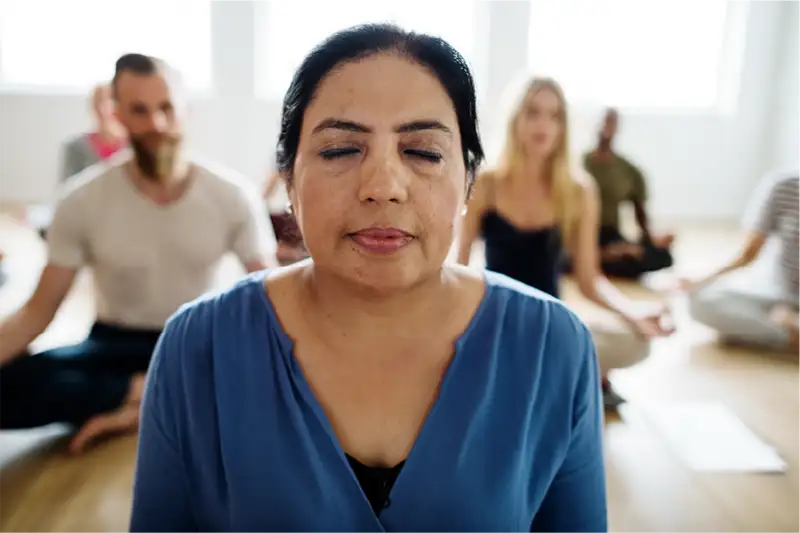Living with chronic pain can feel overwhelming, but you are far from alone. Millions of American adults live with some form of chronic pain, and millions of those experience high-impact chronic pain that interferes with daily life.
At Augusta Pain Center, we understand how deeply pain can affect your quality of life, both physically and emotionally. Our goal is to help patients find relief through advanced, minimally invasive treatments and compassionate care. We’ll explain what chronic pain is, why it occurs, and the most effective ways to manage it, both at home and with professional support.
What Is Chronic Pain?
Pain is your body’s natural warning signal that something is wrong, an injury, inflammation, or illness. Normally, once the cause is treated or healed, the pain subsides. But in cases of chronic pain, that signal continues long after recovery, lasting three months or more.
This type of pain can range from mild to severe and may come and go or persist daily. Chronic pain affects both the body and mind, often leading to fatigue, depression, anxiety, and decreased mobility. When these symptoms combine, the result is chronic pain syndrome (CPS), a condition where emotional distress and physical discomfort amplify one another.
Many conditions can lead to chronic pain. It may result from nerve damage or neuropathy, degenerative joint diseases such as arthritis, past injuries or surgical complications, or spinal disorders like herniated discs and spinal stenosis. In some cases, widespread pain conditions such as fibromyalgia are responsible. Because chronic pain has many potential causes, successful management requires a personalized, multidisciplinary approach, something Augusta Pain Center specializes in.
Why Addressing Chronic Pain Early Matters
Ignoring chronic pain rarely makes it disappear. Over time, persistent pain can cause significant physiological changes, including increased inflammation and hypersensitivity of the nervous system. These changes make pain harder to treat and may impact mental health, sleep quality, and even cardiovascular function.
Early treatment offers the best chance at improvement. At Augusta Pain Center, we emphasize diagnosing the root cause before symptoms worsen. Through a combination of physical therapy, advanced interventional procedures, and mind-body support, we help patients interrupt the pain cycle and regain a sense of normalcy.
7 Evidence-Based Strategies for Managing Chronic Pain
1. Practice Relaxation and Mindfulness
When you live with pain, relaxation might seem impossible, but it’s essential. Deep breathing, meditation, and mindfulness help calm the nervous system, lower stress hormones, and reduce pain perception.
Try simple breathing exercises each morning and evening by inhaling slowly for four counts, holding for two, and exhaling for six. Over time, your body learns to relax more easily. You can also explore mindfulness apps or guided imagery to stay focused and grounded throughout the day.
For physical relaxation, consider aquatic therapy. Exercising in warm water supports the body, reduces joint stress, and helps release muscle tension, allowing for a gentle yet effective form of movement.
2. Manage and Reduce Stress
Stress is one of the most powerful amplifiers of pain. Negative emotions such as anger, frustration, and anxiety can make symptoms feel worse. Learning to manage stress through healthy habits can reduce pain intensity and improve mood.
Engaging in light physical activity like stretching or yoga can calm both the mind and the body. Listening to calming or uplifting music can also help create a sense of peace. Progressive muscle relaxation, which involves tightening and then releasing muscles throughout the body, can relieve tension. Speaking with a licensed therapist about cognitive-behavioral techniques may also help you develop new ways to cope with the emotional side of pain.
If you’re unsure where to start, our team can recommend stress-management approaches as part of your customized chronic pain treatment plan.
3. Exercise Regularly and Safely
It’s natural to fear movement when you’re in pain, but staying inactive can make symptoms worse. Exercise releases endorphins, your body’s natural painkillers, and strengthens muscles to prevent future injuries.
Low-impact activities such as swimming, walking, or cycling can improve flexibility and circulation without putting strain on joints. For patients with significant pain or limited mobility, supervised aquatic therapy is especially effective because it allows for resistance training without the stress of gravity.
Always consult your physician before starting a new routine. Our specialists can create an individualized plan that supports recovery without aggravating your condition.
4. Limit Alcohol and Avoid Smoking
While alcohol might seem like temporary relief, it often worsens chronic pain over time. Alcohol disrupts sleep, increases inflammation, and can interfere with pain medications. Similarly, smoking restricts blood flow and oxygen delivery, which slows healing and heightens pain sensitivity. By cutting back, or eliminating these substances, you give your body the opportunity to heal more efficiently and naturally.
5. Connect with a Support Group
Living with chronic pain can be isolating. Sharing experiences with others who understand your challenges offers both emotional comfort and practical advice. Support groups provide a safe space to discuss coping techniques, lifestyle adjustments, and even new treatment options.
At Augusta Pain Center, we encourage patients to participate in our Chronic Pain Support Group, designed to provide validation, community, and education about medication management, non-invasive therapies, and self-care techniques. Remember, asking for help is not a sign of weakness; it’s an act of strength.
6. Track Your Pain Patterns
Keeping a daily pain journal is a powerful tool for understanding your condition. Each day, record your pain level on a scale from 1 to 10, note what activities you did, what you ate, and how well you slept. Over time, patterns begin to emerge that can help both you and your doctor identify triggers and responses.
This type of record-keeping allows your care team to adjust your treatment plan based on measurable results. Tracking your progress also gives you a sense of control, turning your care into an active partnership between you and your provider.
7. Work with a Pain Management Specialist
Chronic pain is complex and often requires more than one type of treatment. A pain management specialist can evaluate your condition holistically and develop a tailored plan that may include spinal cord stimulation to block pain signals before they reach the brain, injection therapy to reduce inflammation and target specific pain sources, or aquatic therapy to build strength and mobility with less strain. Medication management may also be included to relieve pain safely and effectively.
Our approach at Augusta Pain Center combines cutting-edge medical technology with compassionate, individualized care, helping patients find both immediate relief and lasting improvement.
Which Type of Chronic Pain Treatment Is Right for You?
There is no one-size-fits-all solution to chronic pain. The best approach depends on the type of pain, its severity, and your overall health. Some patients benefit from non-invasive techniques like physical therapy and behavioral counseling, while others may need minimally invasive procedures to interrupt pain signals.
At Augusta Pain Center, we create customized care plans that blend medical innovation with lifestyle support. Whether you’re struggling with back pain, neuropathy, or arthritis, our specialists will guide you toward a treatment path that prioritizes comfort, safety, and long-term wellness.
Holistic Approach: Treating the Mind and Body
Chronic pain affects more than just your body, it also impacts how you think, feel, and connect with others. That’s why our programs emphasize both physical and psychological healing.
Our providers may incorporate counseling or behavioral therapy alongside medical treatments to help patients build resilience and develop healthier coping strategies. When emotional and physical care align, outcomes are significantly better, and patients often regain confidence in their ability to live well despite chronic pain.
Frequently Asked Questions About Chronic Pain
What is the best way to treat chronic pain?
The most effective approach combines medical treatment, physical therapy, and mental health support. Working with a pain management specialist ensures that care addresses the underlying cause rather than masking symptoms.
Can chronic pain ever fully go away?
For some individuals, chronic pain can be significantly reduced or even eliminated through consistent treatment. Others may continue to experience some discomfort but at a more manageable level. Early and comprehensive care improves the odds of long-term relief.
When should I see a pain specialist?
If your pain lasts longer than three months, interferes with daily activities, or worsens despite treatment, schedule an appointment at Augusta Pain Center. Our team will perform a thorough evaluation and recommend next steps tailored to your needs.
Are there non-surgical treatments for chronic pain?
Yes. Many patients find relief through injections and minimally invasive therapies such as nerve blocks, aquatic therapy, or spinal cord stimulation—without the need for traditional surgery.
Start Your Journey Toward Relief
You don’t have to live each day defined by pain. At Augusta Pain Center, we help patients move beyond symptom management to true healing.
Our specialists use advanced, minimally invasive techniques to target pain at its source while supporting your mental and physical wellbeing. From spinal cord stimulation to aquatic therapy, we’ll find the right combination of treatments to help you live with greater comfort and confidence.
Call today or request an appointment to get started. Relief isn’t just possible, it’s within reach.





